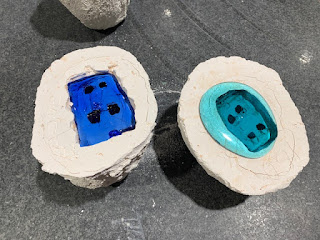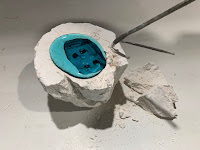I decided to make two little elephants that had linking trunks.
It took a while to form the wax, I melted it then had to
wait for the right temperature to be able to mould it by hand. I had to keep it quite warm to make it malleable.
Next step was to insert cocktail sticks to create air holes
so the glass can flow more freely when it melts into the mould.
Plaster Recipe for refractory mould: (to be measured up as required)
·
1lb plaster powder
·
1lb molochite powder
·
1 pint water
Now it was time to cover the
elephants in the plaster mix. Adding
layers at a time to ensure all the parts were covered.
Once the moulds were done and
dry, it was time to melt out the wax.
This was done over a steamer, allowing the wax to drip into a tray which meant it could be reused.
Once the wax was out I have to fill the moulds with water to measure how much glass I would need (2.5 x the amount of water)
The moulds were then put into the drying cupboard.
Once dry, I filled a terractotta plant pot with the correct amount of glass and they went into the kiln.
The mould was positioned with a table above made from kiln props, on this sat a plant pot with my measured amount of glass in it. Once the glass melted it dripped through the hole in the plant pot down into the mould.
There was a little bit of glass overspill, nothing too dramatic.
Now it was time to very carefully chip away the mould, making sure not to damage the glass inside.
And Voila! Two little elephants emerge.
Now it was time to do some
coldworking. I used a flat bed grinder to remove the bottom slabs of the
elephants, taking the glass right back to where the feet would end.
I also used a diamond Dremel bit to grind off any dribbles caused by the toothpicks – like under the trunk
and excess around the ears.
Quite pleased with how these
turned out, and I learnt so much along the way.














No comments:
Post a Comment
I would love to hear from you, questions, comments and salutations all welcome.